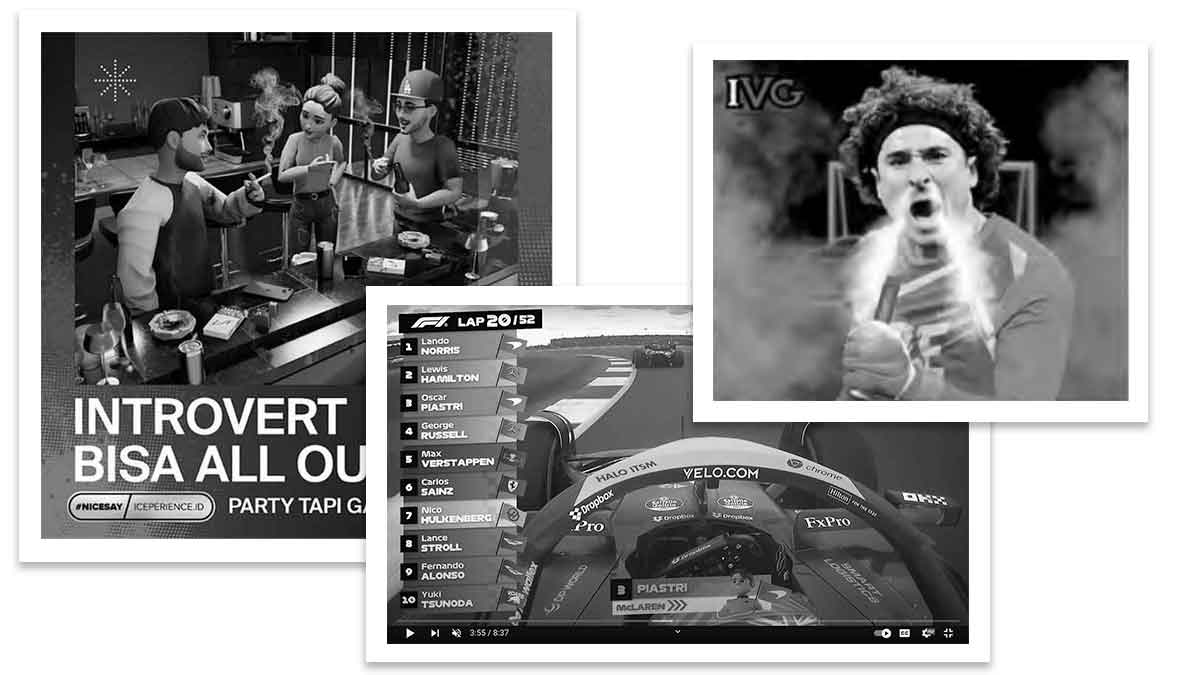- Resources
- News
-
-
Get Email Updates
Sign up for STOP's emails and never miss an update on our latest work and the tobacco industry's activity.
-
Get Funding
Ready to tackle industry interference? You could be eligible for a grant.
-
Share a Tip
Do you have information on tobacco industry misconduct in your country? Let us know.
-
Get Email Updates
Industry Marketing
October 16, 2024

Read this press release in Spanish or Indonesian.
Millions of children are now exposed to e-cigarette and nicotine pouch branding via F1 Kids. Cigarette branding returns through expanded use of historic race footage.
(New York, United States, October 16 2024) — A new report from tobacco industry watchdog, STOP, warns that tobacco industry sponsorship in Formula One is putting a new generation of young fans—including young children—at risk of addiction to tobacco and nicotine products. This includes cigarettes, as Formula One promotes its extensive archive of race footage and photography through new films, streaming platforms and social media.
The report, Driving Addiction: A Race for Future Generations, reveals how F1’s efforts to gain younger fans and more female viewers across Africa, Asia, the Middle East and the Americas aligns with the objectives of major tobacco sponsors Philip Morris International and British American Tobacco. Other key findings in the report include:
- BAT and PMI are estimated to be spending $40 million combined on F1 sponsorship in 2024.
- Over 4 million American and European children between the ages of eight and 12 follow F1.
- Amid growing concern about children and youth uptake of e-cigarettes and nicotine pouches, F1 Kids is exposing young viewers to Vuse e-cigarette and Velo nicotine pouch brands.
- New deals between Formula One and The Lego Group and Formula One and Mattel, Inc. may increase the sport’s visibility among children.
- The majority of the sport’s followers on TikTok and 40% on Instagram are aged under 25 years.
- Total tobacco industry spend in F1 since 1968 is estimated to have surpassed $4.6 billion.
The report adds to extensive evidence and concerns presented by the World Health Organization and STOP that the tobacco industry is using sports, entertainment and digital platforms to hook a new generation.
“It is shocking that F1 programming designed for young children exposes them to branding for Big Tobacco’s addictive and harmful products,” said Jorge Alday, Director of STOP at Vital Strategies. “It’s a fast track to addiction, pure and simple. Regulators need to step up because the tobacco companies have no incentive to stop and F1 appears ever more complicit. With F1’s global reach, every country should hold the sport, its broadcasters and social media platforms accountable for helping tobacco companies advertise to kids.”
“Formula One has undergone a drastic overhaul in the past 25 years, with more races in more countries and on content platforms to appeal to different demographics,” noted Caroline Reid of Formula Money, which provided research for the report. “It’s become more attractive to sponsors aiming to reach younger and more diverse audiences, including the tobacco companies. But in a sport that’s no stranger to controversy, the combination of Big Tobacco and F1 Kids in particular may present new reputational risk that some other sponsors would prefer to avoid.”
PMI and BAT Exploit F1’s Growing U.S. Presence
The report reveals a pattern of PMI activity around U.S. Grand Prix weekends in Austin, Texas, a city where the company is expected to launch its harmful, addictive IQOS heated tobacco product. This marketing includes wooing regional and national journalists with hospitality, hosting a secret concert by rock band KISS, and inviting retail and convenience store industry executives to the race.
F1 also helps BAT aggressively market its Vuse and Velo products to young Americans. Its marketing efforts, in F1 and beyond, appear to be working: The U.S. Centers for Disease Control and Prevention recently reported nearly 14% of middle and high school students who use e-cigarettes use Vuse and more than 1 in 10 who use nicotine pouches use Velo.

It’s a fast track to addiction, pure and simple.
Jorge Alday, Director of STOP at Vital Strategies
Back to the Future: Promotional Booths and Historic Footage
Access to the sport’s own streaming service, F1 TV, now includes more than 2,000 hours of historic race footage, and F1 uses clips and images from past races to promote the sport on social media. Thumbnails on the archive’s homepage show brands including Marlboro, West, Rothmans, Camel and John Player Special. Archival footage has also been shown in programs and films about F1, including documentaries on the history of the sport and an upcoming Netflix series on Ayrton Senna, one of its most famous drivers.
A new development highlighted in the report is that PMI appears to have entered into a deal with Formula One itself, requiring a local race organizer to give PMI space for a booth where it could promote its products to racegoers. This was exposed at the 2024 Dutch GP, with local policymakers and health experts united in calling out F1 and PMI.
“We don’t want to see the return of promotional booths for tobacco products at F1 races and a return to the past when F1 was the industry’s playground. The present is bad enough as it is,” noted Phil Chamberlain, Deputy Director of the Tobacco Control Research Group at the University of Bath. “Another re-emerging threat is BAT, PMI and other tobacco companies enjoying free cigarette advertising from past sponsorship deals, as F1 capitalizes on its archive. And behind the scenes, we should be concerned about PMI and BAT using F1 to woo policymakers and other policy influencers.”
This report is the fourth in a series released by STOP on tobacco sponsorship in F1. The first examined the resurgence of tobacco spending in the sport and the second, tobacco companies’ reach among young F1 fans on social media. The third explored the role of Netflix in attracting new fans to the sport and giving BAT and PMI a billion-minute advertising boost from just one series of “Drive to Survive.” The new report is available at “Driving Addiction: A Race for Future Generations.”
Please contact the STOP press office for more information or to speak to a STOP spokesperson.
About STOP
STOP is a network of academic and public health organizations operating globally as part of the Bloomberg Initiative to Reduce Tobacco Use. STOP connects experts in all aspects of the tobacco industry’s business to expose and counter its relentless efforts to sell harmful, addictive products. For more information, visit exposetobacco.org.
About Formula Money
Formula Money provides data and consultancy about the business of Formula One. Launched in 2007, the reports are a reference tool for companies and individuals researching Formula One sponsorship, race budgets, team finances, broadcast fees, and more. Services cover areas from local economic impact, to sponsorship values, to commercial rights. Formula Money reports are invaluable guides to the sport for both potential and existing stakeholders, such as sponsors, team owners, driver managers and race promoters.



